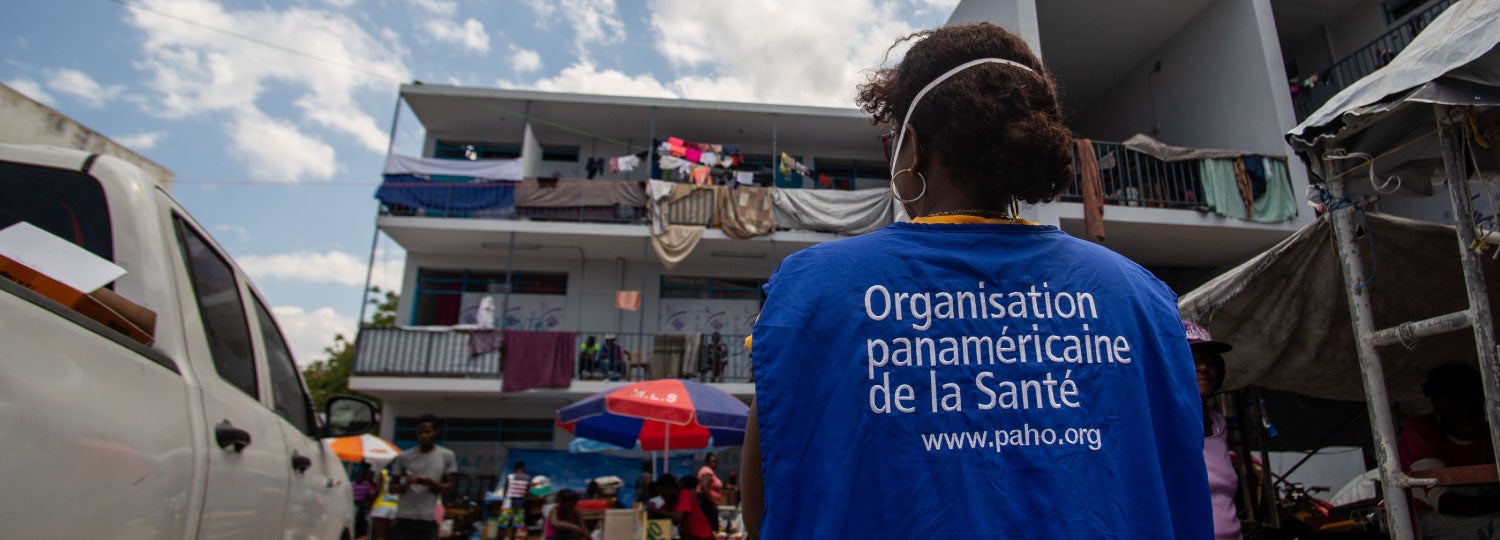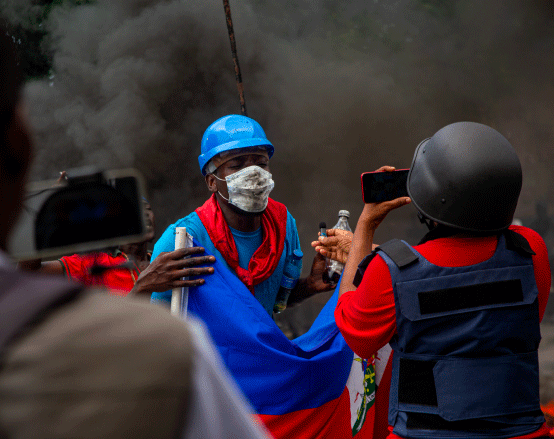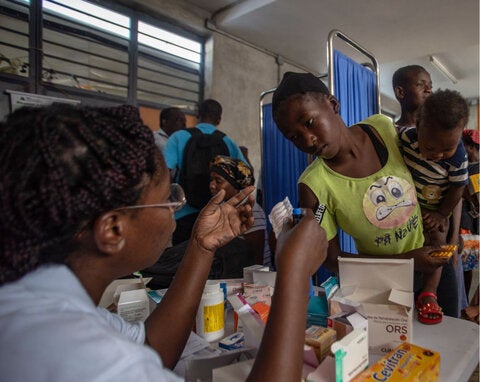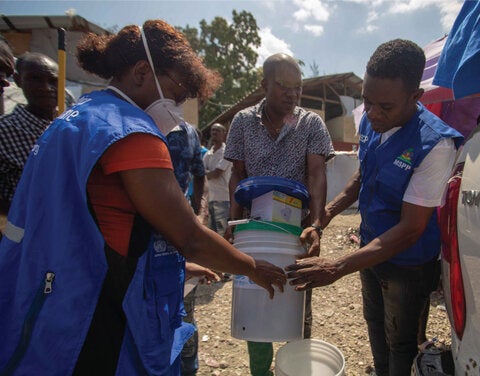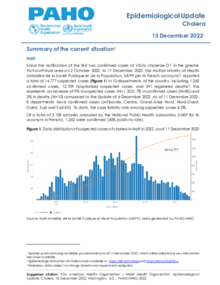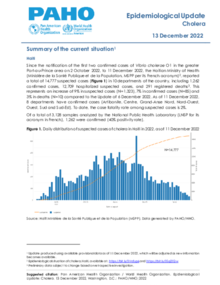A multi-layer crisis
For several years, Haiti has been engulfed in a socioeconomic, political, and humanitarian crisis that reached critical levels in mid-September 2022 due to escalating armed violence and gang control. The widespread insecurity continues to rise in 2025. The situation has drastically affected the country's access to essential goods and services, such as food, water and sanitation, and health care, and forced hundreds of thousands of people to flee their homes.
Meanwhile, a cholera epidemic resurged in October 2022, after 3 years without cases, and spread rapidly across the country. Conditions remain in place for a heightened risk of further spread of this and other diseases, notably in Internally Displaced Populations (IDP) sites.
Current Situation & Health Impact
Access to healthcare remains critically limited for 40% of the population (4.4 million people). Two in five Haitians urgently need medical care.
Attacks forced the closure of two major hospitals and 39% of inpatient facilities in Port-au-Prince.
The loss of human resources jeopardizes skilled services like maternal and neonatal care.
The food crisis affects 5.4 million people (48% of the population), including 6,000 at risk of malnutrition and catastrophic hunger.
The risks of outbreaks of epidemic-prone diseases are high. In a context of low vaccination levels and reduced epidemiological and laboratory surveillance capacity, vaccine-preventable diseases are also a concern. Cholera response, vaccination efforts for diseases like polio, measles, tuberculosis, and diphtheria, as well as outbreak detection and control activities, including those for dengue, are critically limited.
Security issues also disrupted the health sector's capacity to deliver humanitarian aid to the communities that need it most.
In 2025, 6 million people in Haiti need humanitarian assistance, around half a million more than in 2024.
More than 1 million people are internally displaced. Many displaced multiple times.
Only 1 of the 3 major hospitals in the metropolitan area of Port-au-Prince is operating due to attacks.
Insecurity and blockades of ports and airports is significantly limiting foreign assistance to provide vital health supplies and medication.
Cholera Situation
After more than three years with no cases, Haiti's national authorities reported two confirmed cases of cholera in the greater Port-au-Prince area on October 1, 2022. Although the number of reported cholera cases steadily decreased in 2024, active localized outbreaks continue to be detected, and a resurgence of cases has been notified in Port-au-Prince since the beginning of 2025.
Localized outbreaks are still being monitored in some communes, but the crisis impacts the response. Case reporting and confirmation, sample transportation, and the dispatch of medical and WaSH supplies are severely hampered.
PAHO continues its efforts to curb the cholera outbreak, working with national authorities, supporting vaccination campaigns, strengthening the local cholera response team, and providing essential drugs and supplies for treatment.
PAHO/WHO's Response
The Pan American Health Organization (PAHO) has been actively supporting the Ministry of Health (MSPP) and health partners to address the most pressing health needs and protect the lives of the most vulnerable during this crisis. Despite incredibly difficult circumstances, Haitian health care workers and authorities continue to provide lifesaving care, and PAHO remains fully present and operational in the country supporting them.
In 2025, PAHO’s efforts will focus on:
Restoring essential health services, by ensuring availability of and access to emergency and life-saving health services.
Strengthening health system resilience, by maintaining and strengthening disease surveillance and outbreak response mechanisms.
Addressing the needs of displaced and vulnerable populations, by securing critical supply chain operations.
View PAHO's main response activities during the crisis +
- Protection of the operational capacity of critical health facilities to continue providing emergency health services to local populations.
- Provision of critical medicines, equipment, and health supplies from its Regional Strategic Reserve in Panama.
- Maintenance of the cold chain for vaccine preservation through the PROMESS warehouse.
- Support for medical consultations and operation of mobile clinics.
- Provision of blood supplies for transfusions.
- Distribution of hygiene products to IDP sites.
- Supply of fuel to the National Ambulance Center.
- Enhancement of epidemiological and laboratory surveillance.
- Psychosocial support to individuals in shelters.
The Organization is working strategically in collaboration with operational and financial partners, including the World Food Program (WFP), the United Nations Humanitarian Depot (UNHRD), the European Commission Humanitarian Aid (DG ECHO), Direct Relief, the USAID's Bureau for Humanitarian Assistance (BHA), Global Affairs Canada (GAC), European Union Humanitarian Aid (ECHO), German Humanitarian Assistance and the Central Emergency Response Fund (CERF).
Support health authorities to monitor and respond to the urgent health needs of over 96,270 individuals in 54 IDP sites in Léogâne and the metropolitan area of Port-au-Prince with the provision of basic health services, WASH supplies, and epidemiological surveillance.
Facilitated the operations of 58 mobile clinics to bring health services to displaced populations in the capital and two in Artibonite.
Enable nearly 20,000 medical consultations to be carried out.
Mobilize 254 tons of essential medicines and health supplies from its Regional Strategic Reserve in Panama, including more than 38 tons of medical supplies for the care of internally displaced persons. (Since crisis escalated in October 2022)
In 2025, critical funding is needed to maintain and scale up the health emergency response in Haiti. PAHO has called for $18.5 million in funding to sustain health interventions and continue supporting the provision of lifesaving essential health services to the most vulnerable Haitians.
Access Haiti's Health Emergency Appeal to learn more and donate.
Critical health needs include:
Procuring blood transfusion supplies, oxygen, and essential medicines and medical equipment.
Ensuring access to food, transportation, and financial gratification for overworked healthcare professionals reporting for duty;
Provide technical, operational, and logistical support to health facilities to maintain operations (fuel, minor repairs, generators, casualty contingency plan);
Support the National Ambulance Center to increase patient and casualty transfers (fuel, spare parts, medical supplies).
Prepositioning and scaling up logistics and supply chain operations.

